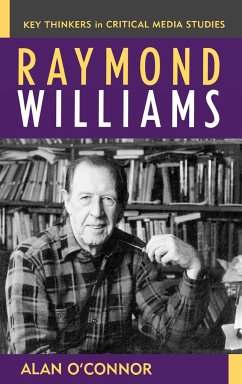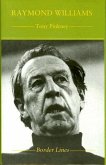Raymond Williams_a Welsh media critic and a pioneer of cultural studies_believed that the traditional focus of biographies on individuals isolated these people from their communities. For this reason, Alan O'Connor looks at Williams and his time period_one of social change and crisis. Williams, son of a railway worker, would have pursued university studies had World War II not disrupted his plans. So the unorthodox intellectual worked outside the university until 1960, his revolutionary media studies emphasizing the interchange between culture and democracy. O'Connor concludes with the same message Williams advocated: In a period dominated by conservative forces, it is still worthwhile to struggle for small changes.
Hinweis: Dieser Artikel kann nur an eine deutsche Lieferadresse ausgeliefert werden.
Hinweis: Dieser Artikel kann nur an eine deutsche Lieferadresse ausgeliefert werden.
Alan O'Connor has written a timely introduction to Raymond Williams. Superbly written, accessible, and very useful. O'Connor highlights the many areas in which Williams's work remains valuable to us today. -- Robert W. McChesney, Institute of Communication Research, University of Illinois, Urbana-Champaign O'Connor captures the complexity of Raymond Williams's voluminous oeuvre, and brings to life the intellectual and political debates that were its driving force. From Williams's dynamic, power-laden conception of culture to his subtle analyses of technology, this book provides a much-needed survey of this important thinker's contributions to the sociology of media and communication studies. -- Rodney Benson, New York University A valuable introduction to Williams's work that is ideally suited to the needs of advanced-level students. While this book is focused on Williams's media work, Alan O'Connor's thorough knowledge of Williams's vast writings makes it a very good entry point to all of this key thinker's ideas. Crisply and engagingly written while highly informative. -- Paul Jones, University of New South Wales; author; Raymond Williams's Sociology of Culture This is a terrific addition to our knowledge of Raymond Williams's contributions to understanding culture, media, and communication. Alan O'Connor has a deep, but non-hagiographic, appreciation of Williams's work, and he shares the fruits of his long years of study with us in a lively, accessible style. He also relates Williams to a wonderful array of other writers (Gramsci, Benjamin, Fanon, Said, and many others), thereby highlighting him against many of the most stimulating thinkers of the past hundred years. -- John D.H. Downing, Director, Global Media Research Center, Southern Illinois University, Carbondale









